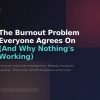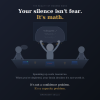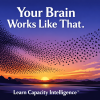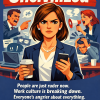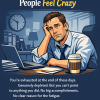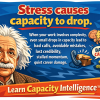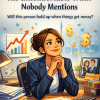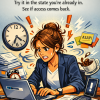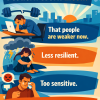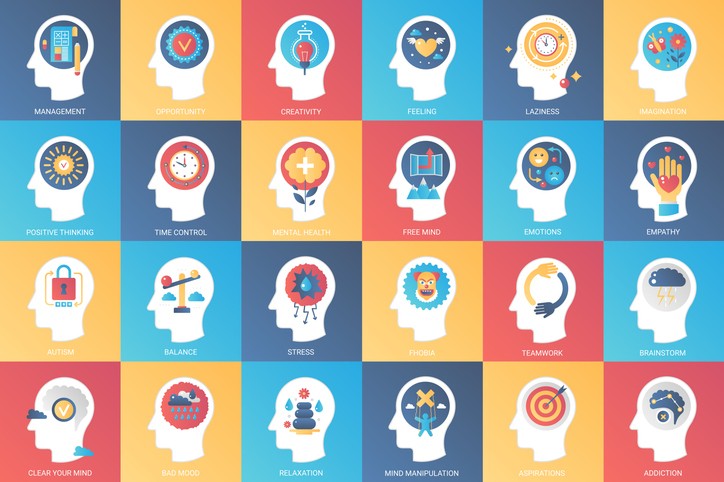
When Self-Awareness Backfires
(And Why Nobody Warns You About It)
It's 11:47 PM. I'm scrolling through the same self-help advice I've read about seventeen times this month.
Be more self-aware. Notice your patterns. Observe your thoughts without—
Yeah, did that. Still anxious. Still exhausted. Still lying here replaying that Slack message from Tuesday where I said "no worries" but definitely had worries.
Currently in 🟡Yellow Zone which explains why this opening is taking me three tries to write. My coffee's gone cold but I keep sipping it like it's doing something.
The Part Nobody Tells You
Here's what the wellness people don't mention — and I'm a little bitter because I wasted like six years thinking I was doing it wrong — self-awareness can actually make things worse.
Not sometimes. Often.
There's this study. Psychologist Anna Sutton, 2016. She measured what actually happens when people get more self-aware. Found four outcomes, not one:
- Reflective self-development (the good kind, you learn stuff)
- Acceptance (being kinder to yourself and others)
- Proactivity (actually doing something with what you notice)
- Emotional costs — guilt, shame, that fun spiral where awareness just becomes self-surveillance
That last one? Nobody puts that in the Instagram graphics.
76% of workers say stress negatively impacts their health. That's from the APA, 2023. And I'd bet money most of them are extremely self-aware about it. We're drowning in awareness. Every podcast, every app, every Monday morning "how are we all doing?" meeting.
We know. We're so aware. I can name my attachment style, identify cognitive distortions, and explain polyvagal theory while waiting for my coffee order.
Still stressed though.
44% of professionals report daily workplace stress — record high, Gallup says. So clearly awareness alone isn't the thing.
Where Was I Going With This
Right. The problem.
Most self-help stops at "notice your patterns." Great. Noticed. I'm exhausted, operating at maybe 40% capacity, and my brain does this delightful thing where it replays every awkward moment from 2019 at 2 AM.
Now what?
This is what I'm calling Status Quo Bias — we keep "being aware" because actually changing feels harder than staying stuck. Better the chaos you know.
Except it's not better. It's just familiar.
What We Built Instead
At Emergent Skills — and I know this sounds like a sales pitch but bear with me because I genuinely built this for myself first — we took Sutton's research and made it usable. Not pretty. Not Instagram-worthy. Usable.
Operationalized Self-Awareness™ — awareness that actually changes what you can do right now.
It's built into what we call the Zones Framework™. Four zones based on your actual current capacity:
- 🟢 Green Zone — Full capacity. You've got insight, acceptance, action all working. Use the big tools here. Build stuff.
- 🟡 Yellow Zone — Awareness without calm. Things take more effort. Brain's buffering. (I'm here right now, can you tell?) Use smaller tools. Lower your standards. It's fine.
- 🔴 Red Zone — Body in alarm, thoughts in spiral. Awareness overload. Reset first. Regulate before you try to reflect on anything.
- ⚫ Can't-Even Zone — System offline. Rest. That's it. Just rest.
Each zone is about operational capacity — how much of you is actually online in this moment. Not how much you should be online. Not how much you were online last Tuesday. Right now. Read about the self-awareness ladder.
The Research Part (Bear With Me)
Sutton's study showed self-awareness produces growth and proactivity if you stay regulated. If you don't? Backfire city.
Which honestly explains a lot about why I spent years "working on myself" and mostly just got better at cataloging my failures.
The WHO says every $1 invested in mental health returns $4 in productivity. But personally? What you get back isn't dollars. It's bandwidth. The ability to think. To decide. To exist without monitoring yourself like you're your own disappointed manager.
And I tell people to meditate, but I can't make it two minutes before checking Slack. So, you know. Work in progress.
What's Actually In It For You
Energy, probably. Some clarity. Maybe — and I'm not promising this — but maybe a night where you don't replay every work conversation you've ever had.
The Zones Framework™ lets you match tools to your current capacity. Not ideal capacity. Not the capacity you had that one good week in March 2019.
Your capacity right now.
Permission to scale down when you're in 🟡Yellow or 🔴Red. Permission to just stop when you're in Can't-Even.
Did I mention I'm in 🟡Yellow Zone? This paragraph is proof.
The Rage Interlude
Can we talk about the structural absurdity for a second?
77% of workers worldwide are disengaged. Costs the global economy $8.8 trillion. And companies' solution is... pizza parties. Maybe a meditation app.
Meanwhile we're answering emails at 11 PM because someone marked something "urgent" that could've waited until literally any Tuesday.
I've bubble-bathed. I've journaled. I've done breathing exercises in bathroom stalls between meetings. The problem isn't that I need more awareness. The problem is I'm fully aware that this is unsustainable and I have a mortgage.
But that's— actually, I lost my point mid-sentence. Hold on. Never mind.
The Cognitive Thing You're Doing Right Now
Optimism Bias — you think next week will be calmer.
It won't.
You think once you finish this project, once you get through Q4, once the holidays are over, then you'll have space to implement all this self-awareness you've accumulated.
But awareness without capacity becomes one more thing on the list. One more way you're failing. One more Sunday realization that you're still doing the thing you said you'd stop doing—
...yeah, lost my train of thought again.
The Zones Framework™ interrupts that. Not with a goal. Not with a destination. With a map that says: You are here. These are your exits. This works at this altitude.
Where This Lives
This is what we call a Reset post — when you just need to stop free-falling. Not build habits. Not optimize anything. Just stabilize.
Better workforce health adds $3.7–11.7 trillion in global value, McKinsey says. That's 4–12% of GDP.
For you personally it means eating lunch away from your keyboard and maybe not viscerally hating Mondays.
What Helps (When I Remember)
Name your Zone
Navigation, not self-flagellation
Pick one tool that matches your capacity
Not the perfect tool, the doable one
Stop when you're in Can't-Even
That's it. Just rest.
The Zones Framework™ scales everything. All 10 life skills pillars. Every tool has a version that works when you're half-functional.
Which honestly is most of the time for most of us.
Ending This Before I Lose Steam
I started this wanting to write something neat about how awareness is a gift when used correctly.
But I just got a Slack notification and completely lost my train of thought, so instead:
Your brain isn't broken. The tools are.
Self-awareness without capacity is surveillance with better branding. The Zones Framework™ gives you the missing piece — how to operationalize what you notice so it changes what you can actually do.
Progress. Not perfection. Mostly just survival with slightly better lighting.
Actually Useful Links
Written in 🟡Yellow Zone. These paragraphs sponsored by coffee #4 and the vague hope that "next week will be better" (it won't, but optimism bias is persistent).

